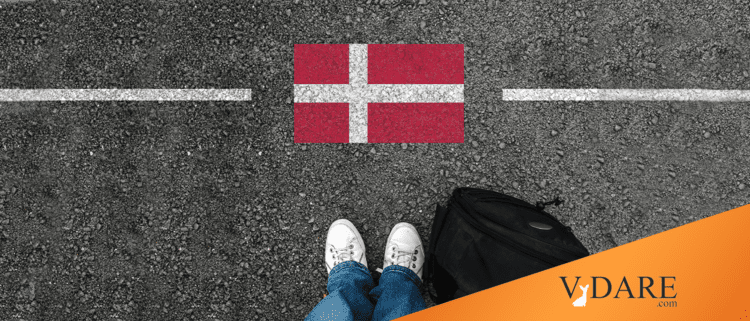


By Steve Sailer
08/07/2011
I must confess that when I read articles from the mainstream media in Europe denouncing immigration restrictionists with hateful rhetoric and little of substance, I sometimes wonder if my leg is being pulled. For example, is this April 29, 2011 article from Spiegel on Denmark’s decade-long success in implementing a more rational immigration policy a self-parody? Perhaps the reporter secretly wanted to laud the Danish government as thoughtfully reformist, but had to lather it in spiteful rhetoric to get it published … I don’t know. (I particularly like the chosen photo, with the fat lout trying to look surly in the front and the youth with the “Soldier of Allah” sweatshirt.)
In Sweden, immigration has increased income inequalityhttps://t.co/rqfqR3Ulbu
Immigration to Sweden is a net cost even in the long runhttps://t.co/om4RZHN7hn
Immigration to Denmark has on net cost billions of dollarshttps://t.co/OHvk7kexKm
— Francis (@JPFabricate) December 12, 2021
Immigrants in Copenhagen: The government has calculated their supposed cost to the country.
Putting a Price on Foreigners
Denmark’s strict immigration laws have saved the country 6.7 billion euros, a government report has claimed. Even though Denmark already has some of the toughest immigration laws in Europe, right-wing populist politicians are now trying to make them even more restrictive.[Emphasis added]
Denmark’s strict immigration laws have saved the country billions in benefits, a government report has claimed. The Integration Ministry report has now led to calls among right-wing populists to clamp down further on immigrants to increase the savings.
The extremely strict laws have dramatically reduced the flow of people into Denmark in recent years, and many government figures are delighted with the outcome. “Now that we can see that it does matter who comes into the country, I have no scruples in further restricting those who one can suspect will be a burden on Denmark,” the center-right liberal integration minister, Søren Pind, told the Jyllands Posten newspaper.
Pind was talking after the ministry’s report — initiated by the right-wing populist Danish People’s Party (DPP) — came to the conclusion that by tightening immigration laws, Denmark has saved €6.7 billion ($10 billion) over the last 10 years, money which otherwise would supposedly have been spent on social benefits or housing. According to the figures, migrants from non-Western countries who did manage to come to Denmark have cost the state €2.3 billion, while those from the West have actually contributed €295 million to government coffers.
‘Restrictions Pay Off’
The report has led to jubilation among right-wing politicians: “We now have it in black and white that restrictions (on immigrants) pay off,” said DPP finance spokesman Kristian Thulesen Dahl. The DPP will almost certainly exploit the figures in future negotiations over the Danish economy.
But the report has sparked outrage from opposition parties like the centrist Social Liberal Party, which dismissed it as undignified and discriminatory. The party’s integration spokeswoman, Marianne Jelved, said: “A certain group of people is being denounced and being blamed for our deficit, being made into whipping boys.” She added: “We cannot classify people depending on their value to the economy. That is degrading in a democracy that has a basic value of equality.”
Still, the announcement has not come as surprise. The right-wing populist DPP, which has been working with the ruling center-right coalition government of Prime Minister Lars Lokke Rasmussen since 2001, has in the past made its aims very clear: a complete halt to immigration into Denmark from non-Western countries. “A Somali who is no good for anything, that is simply not acceptable,” said DPP leader Pia Kjærsgaard. Similarly, center-right liberal Prime Minister Rasmussen has also said anyone who would be a burden on Denmark is not welcome in the country.
… The small Scandinavian country already has the strictest immigration and asylum laws in Europe. For example, foreign couples are only allowed to marry if both partners are at least 24 years old. The number of asylum seekers and relatives of immigrants seeking entry into Denmark dropped by more than two-thirds within nine years as a result of the tough laws.
A Decisive Issue in Denmark
But things may soon get pushed even further. Elections are due to be held this fall, and the ruling parties apparently want to put forward even stricter rules, driven by the xenophobic rhetoric of the right-wing populists. In polls, the approval ratings of more liberal politicians have fallen, and the opposition center-left Social Democrats have promised not to change current immigration laws if they win the election. Immigration will always be a big issue in Denmark — almost 10 percent of Denmark’s 5.5 million people are migrants — and the issue was a decisive one in the last election, in 2007.
In November, the government agreed to stricter laws and made the entry of immigrants’ spouses more difficult. Only those who collect enough “points” may come to Denmark in the future — with points being determined by factors such as academic qualifications and proof of language proficiency. In addition, the equivalent of €13,000 must be deposited with the state in the form of a bank guarantee to cover any future public assistance. Socially deprived areas with a disproportionately high number of immigrants will be subject in future to a so-called “ghetto strategy” designed to prevent high concentrations of foreigners in public housing areas. Migrants will be assigned housing, and three-year-old children who do not speak Danish well enough will be required to attend state child care.
Some immigrants have already turned their back on Denmark voluntarily. Increasing numbers of Somalis are moving away, especially to the UK, the Jyllands Posten reported on Thursday, because of discrimination.
In other words, leaving aside all the hate words used by Spiegel to spice it up, Danish immigration restrictionists have been thoroughly vindicated, with their opponents left with nothing but platitudes, while promising not to undo their reforms if they get elected.